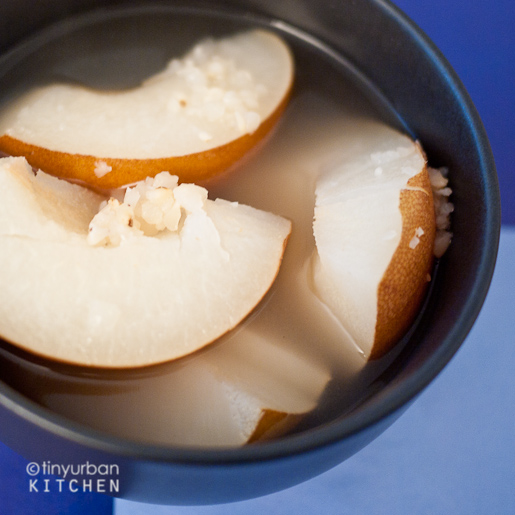
*Cough cough cough cough*
I have been battling an awful cough for the last 5 weeks. I haven't been this sick since the same thing happened to me 8 years ago. I get these violent coughing spasms that are so disruptive I usually have to leave the room so as not to freak out everyone. Worse yet, I think I bruised the intercostal muscles in my ribcage, which makes it pretty painful whenever I do cough.
So August has been sort of a drag. I can't exercise anymore (sorry boot camp!), and yet I know that the warm weather will be leaving soon. Such a bummer!
My mom heard of my plight and offered to send me some Chinese herbal medicine. Apparently she always makes this for my dad and it helps out with coughs. Well, I know from past experience that even Robitussin with codeine can't really stop my coughs, so I was curious about this ancient pear soup that people in China have been drinking for centuries.

So what the heck am I actually eating here?
Fritillaria (know as chuan bei in Chinese) is a bulbous flowering plant often used in Chinese medicine to treat coughs or other lung conditions. According to traditional Chinese medicine, this compound is "cooling" and affects the "heart and lung meridians." It is typically used to moisten dry mucous membranes, loosen phlegm, and suppress coughing.

I know a lot of people in America are quite skeptical about Chinese medicine, and I still don't know exactly what I think either, so I thought I would at least investigate the science a little bit.
Research conducted in China has shown that compounds in fritillaria (including verticine, verticinone, imperialine and thymidine) help inhibit the contraction of bronchial smooth muscle and decrease mucus secretion. The unprocessed bulb is poisonous, although commercially available bulbs are usually processed.

verticinone
There have been no toxicities associated with oral administration of the medicine, although high IV doses have been associated with reduced blood pressure, slower heart rate, pupil dilation, and tremors. I've seen warnings that pregnant women and children should not take this either, but I am not certain of the reasons.
More recently, scientists have even synthesized analogs of these isosteroidal alkaloid compounds and have shown that they have even stronger antitusstive and expectorant properties.

Bottom line: It looks like there are definitely active compounds in this bulb that have been shown to have clinical effect on coughs, though at higher doses they might affect other things too. Overall it seems reasonably safe if taken orally in small doses, and it seems to work for my dad.
At this point I had been coughing for over 4 weeks so I was happy to try anything.
Epilogue (sort of, not really yet)
That was two days ago, and I've had two bowls of this stuff so far. My cough virtually disappeared yesterday afternoon (after having it for breakfast), but it came back with a vengeance right around 9PM. I had it again this morning and so far the cough has been suppressed. Only time will tell.
As for taste, this soup tastes good for a Chinese remedy. It tastes like a light, slightly sweet pear soup with tiny bits of barley in it. It's soothing for someone who's sick. The bulbs themselves are just slightly bitter, but the sweetness of the pear and the rock sugar really take most of that bitterness away.
Fritillaria Pear Soup
~ 1 T fritillaria
Rock candy or honey to taste (optional)
1 Asian pear, sliced
Put the semi-crushed fritillaria "beads," rock sugar, and diced pear in a ceramic bowl. Fill up the bowl with hot water and steam for about 30-45 minutes, or until the pear is soft. Serve immediately.

Disclaimer
I am by no means a doctor (unless if you count juris doctors) and all of the information I discuss above was taken straight off of the internet. If you are seriously considering taking chuan bei mu (fritillaria) for your cough, definitely consult a medical professional. I have no idea if it interferes with other compounds (e.g., other cough medicines, alcohol, other medications, etc.). Personally I don't take Mucinex or Robitusson if I've had chuan bei mu, but then I tend to be a little paranoid/overly cautious about drug/drug interactions. :)

No comments :
Post a Comment